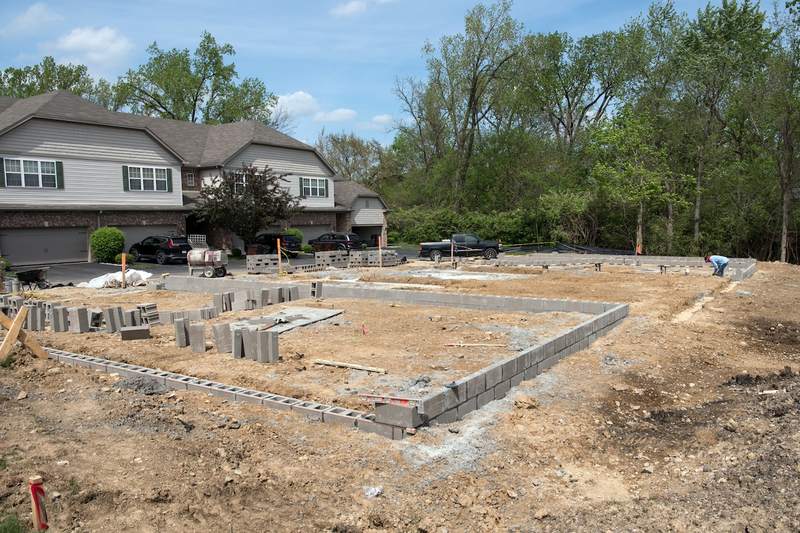For many aspiring homeowners, the prospect of purchasing a piece of land and building a home offers distinct advantages that resonate with a particular segment of borrowers. Since you plan to build a home customized to your preferences and specifications, the purchase process differs from buying an existing home – particularly the need to buy the land.
What Is A Land Loan?
A land loan is precisely what it sounds like: A loan the borrower uses to buy vacant land or undeveloped property. It’s also known as a lot loan.
Land Loans Vs. Construction Loans
A land loan finances the purchase of vacant land, while a construction loan funds the construction or renovation of a building.
Sometimes, these loans may be combined into a single construction-to-permanent loan package.
What’s Your Goal?
Buy A Home
Discover mortgage options that fit your unique financial needs.

Refinance
Refinance your mortgage to have more money for what matters.
Tap Into Equity
Use your home’s equity and unlock cash to achieve your goals.
Types Of Land Loans
The type of loan you need will depend on the land’s purpose, current state and your financial goals.
Raw Land Loan
Raw land, also known as vacant or undeveloped land, hasn’t been improved, developed or built on. It’s essentially an empty canvas with no structures or infrastructure.
You can find raw land in urban and rural areas. The potential uses of raw land depend on several considerations, including its location and zoning regulations.
Unimproved Land Loan
Unimproved land generally refers to land that lacks significant improvements or developments but may have undergone minor changes or alterations from its natural state. These alterations can include basic leveling, grading or clearing of vegetation.
Unimproved land shares many similarities with raw land, but the two have subtle distinctions. Unlike raw land, unimproved land may have undergone minor modifications from its natural state, but it lacks substantial structures or infrastructure.
Improved Land Loan
Improved land refers to property that has undergone significant development and enhancements. Improved land is characterized by its development, infrastructure and functional use, making it more suitable for specific purposes and often commanding a higher market value than raw or unimproved land.
Ready To Become A Homeowner?
Get matched with a lender that can help you find the right mortgage.
How Do Land Loans Work?
You can get a land loan the same way you get a mortgage. You’ll need to meet the lender’s requirements, make a down payment, pay closing costs, and repay the loan with interest over the loan term.
Unlike buying a home, where the property serves as collateral for the home loan, it’s harder to assess how much land is worth because there’s no collateral attached to the property.
Here are some general requirements borrowers need to meet to get a land loan:
- A minimum credit score of 720.
- An explanation of their intended land use.
- Confirmation of the current zoning, land-use restrictions, surveyed boundaries and access to utilities.
Take The First Step To Buying A Home
Find a lender that will work with your unique financial situation.
Land Loan Rates
Interest rates on land loans tend to be higher than on mortgages because lenders consider them riskier due to the absence of structures. A lower debt-to-income ratio and higher credit score can help you qualify for lower interest rates. It’s a good idea to shop around and compare lenders to see which offers you the most favorable rates and loan terms.
Should You Use A Land Loan?
Before deciding whether this type of financing is right for you, review the pros and cons of a land loan to see if it fits in with your financial goals.
Pros Of Land Loans
Here are some benefits borrowers can expect from a land loan:
- Specialized: A land loan is explicitly customized to buying land, whether you’re building a dream home, embarking on a commercial venture or investing.
- Flexible: Land loans are flexible enough to match your vision while offering the potential for the land’s value to appreciate over time.
- Convertible: You can refinance a land loan into a construction loan to cover building costs. Then, you can convert the construction loan to a traditional mortgage once you move into the home.
Cons Of Land Loans
Here are some drawbacks borrowers should consider before applying for a land loan:
- Higher costs: Land loans have higher interest rates and substantial down payments, making upfront costs significant.
- Bigger monthly payments: The shorter terms on land loans may require a higher monthly payment.
- Fewer lenders: The limited number of lenders offering land loans can make it more challenging to find favorable terms.
Where Can You Get A Loan For Land Financing?
You can get a land loan from banks, credit unions, specialized lenders and online lenders. Here are common options:
- Private lenders. Local and national banks and credit unions typically offer land loans. Some lenders specialize in providing land loans and may have more flexible terms and expertise in land-related financing.
- Small business lenders: Business owners can use the Small Business Administration 504 loan program for certain real estate purchases, including land acquisition. The program has conditions and limitations, typically requiring one loan from a certified development company and a second from a private lender.
- Farm Credit institutions: Farm Credit institutions provide loans for agricultural land purchases. The institutions often have loan products tailored to farming and rural properties.
How To Get A Land Loan
The first step is finding a lender that offers land loans. When you’re ready to apply, gather and submit the required documents, such as proof of income, personal identification, and a detailed plan of your proposed land use. Check your credit score, too. If it’s below 700, consider improving your credit score to increase your chances of earning a better interest rate.
If the lender approves your land loan, you’ll make a down payment and sign a loan agreement that details its terms and conditions.
Alternative Forms Of Land Financing
There are alternatives if you’re considering acquiring land for a specific purpose but are hesitant about taking out a traditional land loan.
Construction Loans
Construction loans fund the building or renovation of a property and are typically offered by private lenders or traditional financial institutions.
A construction loan works in stages. Funds are disbursed incrementally as different construction milestones are reached. Common stages include foundation, framing and completion.
Borrowers typically submit detailed plans and cost estimates and may need to hire builders and contractors. Lenders assess a borrower’s creditworthiness, income stability and the value of the proposed property to determine eligibility.
USDA Construction Loans
U.S. Department of Agriculture construction loans, including Section 502 and Section 504 loans, are specialized loans designed to support the construction, repair or improvement of homes in eligible rural areas.
The Section 502 Guaranteed Loan Program is designed to help low-income borrowers buy affordable housing. The Section 504 Home Repair Program provides loans to individuals who are 62 or older and can’t secure financing elsewhere. The program offers loans with favorable terms and low interest rates that help homeowners make renovations to improve their living conditions.
Both programs typically require a minimum credit score of 640 and a maximum DTI ratio of 41%.
FHA Construction Loans
To obtain a Federal Housing Administration construction loan, applicants typically need a credit score of 580 or higher. A down payment of at least 3.5% is required, and borrowers must have a steady source of income and proof of employment.
Lenders also consider a borrower’s DTI ratio, which generally should not exceed 43%. The property must comply with FHA property guidelines and undergo an appraisal to assess its value.
VA Construction Loans
Veterans Affairs construction loans are available to eligible veterans, military service members and their spouses who plan to build a new home or renovate an existing one. These loans offer several benefits, including no down payment. VA construction loans typically have competitive interest rates, and borrowers benefit from the backing of the federal government, which reduces the risk for lenders.
The VA’s strict property requirements ensure that the home being built or renovated meets its quality and safety standards.
Home Equity Loans And HELOCs
With a home equity loan or home equity line of credit, homeowners can use their equity in their current home to buy land and build a dream home.
With a home equity loan, a homeowner borrows a lump sum based on their equity. A HELOC is a revolving credit line based on equity that homeowners can draw from as needed.
Seller Financing
Seller financing is an alternative route to land acquisition, allowing buyers and sellers to create flexible arrangements. With a land contract, also known as a contract for deed or installment sale agreement, the seller acts as the lender, allowing the buyer to make payments directly to them over an agreed loan term.
This approach particularly appeals to buyers who struggle to qualify for a traditional loan or want more flexible terms. The buyer gains ownership of the land while making regular payments, and the seller retains legal title until the contract is fulfilled.
Land contracts can be customized to fit the needs of both parties, negotiating interest rates, repayment schedules and other terms.
The Bottom Line
A land loan is a specialized financial tool for buying undeveloped land or vacant property. While different from traditional mortgages, land loans offer advantages such as ownership of a desired piece of land, customization and potential appreciation. However, challenges include higher interest rates, larger down payments and shorter loan terms.

Christian Byers
Christian Byers is a freelance writer and editor with experience covering diverse topics. He has a Bachelor of Science in Journalism and a Bachelor of Arts in Communications from Eastern Michigan University. His experience as a writer and editor includes publications such as The Eastern Echo, Rocket Central and Woodward Sports Network.












